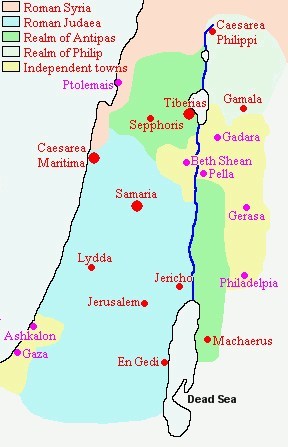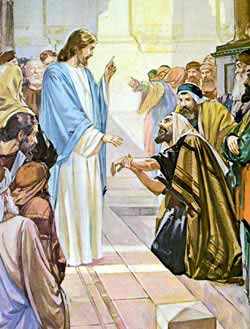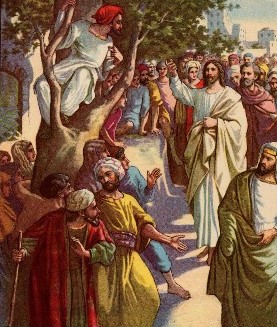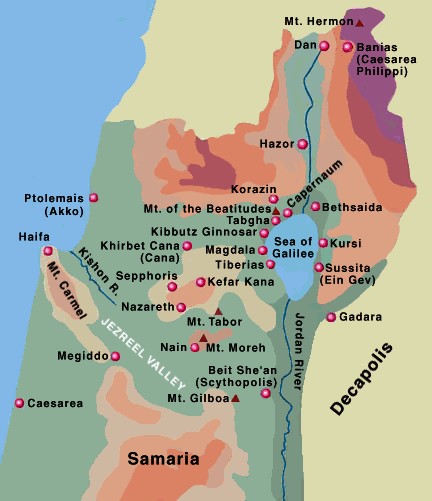

Let's take a look at the baptism of Jesus, the testing of Jesus,
His ministry in Judea, and His ministry in Galilee. Why? Because the more we know about
Him the greater our respect will be for Him, and then the greater our love will grow for Him.
This is one reason why it is good to read and study the bible every day.

Let's look at the water baptism of Jesus Christ. Why? Because He is showing us the way to follow. The Greek word for the English word "baptism" is "baptizo" which means to immerse, plunge, dip, or bury in water. The act of water baptism is an outward symbol (of water) of an inner cleansing (by blood).
Jesus was baptized by John the Baptist in the Jordan river near Bethany. Jesus was
about 30 years old when He was baptized.
John was reluctant to baptize Jesus, for he said
Here is the scriptural account of Jesus' baptism in water:
"Then Jesus came from Galilee to the Jordan to John, to be baptized by him. John
would have prevented him, saying,
The phrase "to fulfill all righteousness" simply means "to set the
example." Jesus was setting an example for the rest of us to follow.
Baptism by submersion signifies the death and resurrection of Jesus Christ. The
believer goes under the water signifying death (as when one is placed beneath the sod
in physical death). The believer comes up out of the water signifying resurrection.
As Jesus was resurrected so also each of God's saved children will be resurrected
to life everlasting. The scripture on this is:
"Do you not know that all of us who have been baptized into Christ Jesus were
baptized into His death? We were buried therefore with Him by baptism into death,
so that as Christ was raised from the dead by the glory of the Father, we too might
walk in newness of life. For if we have been united with Him in a death like His, we
shall certainly be united with Him in a resurrection like His"
Here are a few other scriptures on water baptism:
Matthew 28:19-20:
Acts 2:38-41:
What in the world is the holy trinity?
The Trinity or godhead consists of 3 beings:
Does this doctrine have a biblical foundation? Yes.
Besides John the Baptist, there are 3 Individuals presented at the water baptism of Christ:
When Jesus came up out of the water, God the Holy Spirit descended as a dove, and the
voice of God the Father spoke from Heaven, saying:
These are wonderful key verses of scripture that prove the doctrine of the holy trinity.
How can we possibly try to understand the holy trinity? Well, we each have a finite
mind that is tainted by sin. How can the finite understand the infinite? When God was
showing Job Who He was, He explained to Job how great He was. God asked Job questions that
Job could not answer. How can the pot ever hope to describe adequately the Potter who made
it? It was not necessary for Job to fully understand God for Job to trust and love God.
Sometimes God hides Himself in His sovereignty. We are not always given all the answers
to the questions of life. Maybe something has happened to you that you don't fully
understand. Just trust the Lord that He cares for you and looks over you for your good and
for His glory. That should be good enough for us. This is where walking by faith is so
important.
Can you explain how a man and a woman, who are two individuals, after they get married
are one flesh? This speaks of the spiritual side of marriage and the eternal triangle
(man, woman, and God). Since God is spirit, the fact of the holy trinity is much better
understood when taken on faith.
Are there any folks who disagree with this doctrine? Yes. One Christian cult hates the
church and everything it stands for. They deny this doctrine and say that only Jehovah
God (God the Father) is deity here. Another church group believes that Jesus spoke in
such a manner that "He threw His voice by trickery" to make it sound like it
came from Heaven. They deny this doctrine and say that only Jesus (God the Son) is deity
here. Another group believes that Jesus is an incarnation of the Father. And there are
other groups who falsely believe one thing or another in relation to this doctrine.
Some folks refer to God the Holy Spirit as an "It". God the Holy Spirit is
presented as an Individual, Who leads Jesus into the wilderness after He is baptized.
John the Baptist called God the Holy Spirit by the masculine pronoun "He," which
also shows that God the Holy Spirit is not an "It," but an Individual"
Following His baptism, Jesus was lead by God the Holy Spirit into the wilderness to
be tempted by the devil. Jesus began His ministry after these events.
Let's take a look at the testing of Jesus Christ by the devil. Why? Because all testing is similar. The way Satan tested Christ may be the way the he tests you and I. It will help each of us to know what Satan may throw at us. Satan did not test Christ's deity. Satan tested Christ's humanity. Satan thought that Christ's humanity (or flesh) was His weak point. Prior to this time Satan had tested humans (for thousands of years) to sin against God due to the weakness of their flesh. And, unfortunately, he had been somewhat successful with this strategy.
The bible states that Jesus Christ was tempted in all points like we are
Most human temptations are divided into three main areas:
Satan also used these 3 areas of temptation on Adam and Eve and he was successful. Why shouldn't he try these 3 also on Jesus? Why shouldn't he try these on you and I? Satan's strategy is to derail you and I from our relationship with God. Let's look at these temptations:
In regards to the lust of the flesh: {my (Kraig Rice) paraphrase}
Satan told Jesus to turn the stones into bread to eat. It would be pleasurable to eat the bread.
In the first temptation Satan tempted Jesus with his true personality. Jesus used the
Word of God, His dependence and faith on His Father, and He used the power of the Holy
Spirit to defeat Satan. The fulness of the Holy Spirit yields power to help you overcome
temptation. Satan appealed to Christ as a man. Satan used His hunger for food as a
temptation: be independent- take your own initiative to satisfy your needs and wants.
But it's sin to act independent of God. Christ did nothing apart from the will of
His father. The physical shall not dominate is the answer that Christ gave to Satan.
My note:
Satan told Jesus: look at all of the money, sex, power, and fame that is in the evil world system. You can have it all. Look at the glitter of sparkling diamonds and the yellow color of all of that gold. I will give it all to You if you fall down and worship me.
In this temptation the devil was trying to get Jesus away from the pathway of perfect service. The devil is the prince of this world. Service is linked to worship. Satan thinks that every person has a price at which they can be bought. He can offer money, sex, power, and fame to get a person to serve and worship him.
My note:
If you are a fisherman you want to use a glittery lure to attract the fish. It looks so good to the hungry fish. But the lure does not taste as good as it looks-
What is lust? One description of lust is when a person takes the second look. There is a true and tragic story in the Bible that emphasizes my point. This story starts off this way: "David's son Absalom had a beautiful sister named Tamar. And Amnon, her half brother, fell desperately in love with her. Amnon became so obsessed with Tamar that he became ill. She was a virgin, and it seemed impossible that he could ever fulfill his love for her."
Amnon lusted after his half sister. He took the second look. After he raped her the
fruit of the victory did not taste as good as it had looked. Guilt can do that.
"Then suddenly Amnon's love turned to hate, and he hated her even more than he
had loved her. "Get out of here!" he snarled at her.
The story had a tragic ending.
"So at Absalom's signal they murdered Amnon."
Satan told Jesus: Go ahead and throw yourself down. You won't die. A god cannot die. Trust in yourself without God's help. Be self sufficient. Only pride in Himself would have made Jesus throw Himself down. But that was Satan's sin. Instead, Jesus was humble. Jesus did not trust in Himself to do His own will but His father's will. Christ is God but He didn't have to prove it to Satan for this test.
In this temptation Satan tried to undermine Christ's trust and confidence in God. The high pinnacle shows pride. Each of us should beware of pride that would lead us down the wrong pathway. To test God in this manner would be to show a lack of trust in God. Trust abides in confidence.
My note:
Because Jesus was a victor over the 3 temptations, we know that God understands our
human dilemma- that we cannot successfully combat the evil temptations of Satan with
the weakness of our flesh- for that we need His inner strength working through us.
Jesus had to experienced these three temptations prior to entering
His public ministry. And now He is able to sympathize with us and help us when we
come to Him in prayer and supplication- seeking His strength for deliverance from
all kinds of temptation(s).
Let's look a little deeper at the testing of Christ.
"And immediately the Spirit impelled Him to go out into the wilderness. And He was in
the wilderness forty days being tempted by Satan; and He was with the wild beasts, and
the angels were ministering to Him"
Following the baptism of Christ, Mark indicated that the Spirit "immediately" led
Jesus into the wilderness. The word "wilderness" refers to a general area of Israel
that is bare and desolate of much vegetation and people.
Was it unusual for folks to fast for 40 days like Jesus did?
I think so, but Moses and Elijah fasted for that length of time before receiving their divine revelations
from God:
So he (Elijah) arose, and ate and drank; and he went in the strength of that food forty
days and forty nights as far as Horeb, the mountain of God
"And after He had fasted 40 days and 40 nights He then became hungry. And the tempter
came and said to Him, "If you are the Son of God, command that these stones become
bread"
In the first temptation Satan tried to place doubt in the mind of Jesus with the
words "If you are the Son of God." The danger of this temptation was not in
making bread. Jesus was not under a prohibition from miraculously creating food. Later, on two
occasions Jesus used His divine power to create bread for the feeding of the 5,000 and also
for the feeding of the 4,000
How did Jesus respond? He simply quoted Moses:
"Then the devil took Him up into the holy city, set Him on the pinnacle of the temple,
and said to Him, "If You are the Son of God, throw Yourself down. For it is written:
"He shall give His angels charge over you," and, "in their hands they
shall bear you up, lest you dash your foot against a stone"
In the second temptation of Jesus, Satan challenged Jesus to throw Himself down from
God's temple. Would this be an act of suicide or a leap of faith? If Christ were
really God, then He would know the difference and stake His life on His decision.
To deceive Christ, Satan misquoted scripture from
"Again, the devil took Him up on an exceedingly high mountain, and showed Him all
the kingdoms of the world and their glory.
And he said to Him, "All these things I will give You if You will fall down and
worship me"
In the third temptation Satan offered Jesus what he has offered to many others:
money, sex, power, and fame. But the price is that you have to
give your eternal soul to Satan and worship him with your disobedience against God and
His church. Judas Iscariot followed this pathway and you can read in the bible what
happened to him. Satan's plan is to use a person and then destroy them.
Satan is the Prince of the Power of the Air. He is the god of this world and the ruler
over the evil world system. This system is in opposition to the church and is anti-Christ
in it's impact. Christ would never bow the knee to Satan as Christ came to destroy the
works of the enemy. None of us should ever bow the knee to Satan, either. If you love the
Lord, you are a member of the church universal and a soldier of the cross. Your job is to
take souls away from Satan and promote God's kingdom here on this earth. Onward Christian
soldiers! But there is a continual battle to be fought against Satan and his imps because
we are in enemy territory. It is as if we are behind enemy lines in the fight of our lives.
So was Jesus rude, crude, or socially unacceptable to Satan? No. Jesus simply replied
Jesus would not violate one of His own 10 commandments:
Jesus was tempted by Satan, and was in fact tempted in all the main ways that we
are tempted today. Yet He did not sin. One reason Jesus is our perfect high
priest is because He can sympathize with us. He knows how it felt to be tempted, and
He can give us the strength today to overcome the temptations that come to us.
"For we do not have a High Priest who cannot sympathize with our weaknesses,
but was in all points tempted as we are, yet without sin"
Here is the story of Christ's testing in different words that may be a little easier
to understand.
Then Satan tempted Him to get food by changing stones into loaves of bread. "It will
prove you are the Son of God," he said. (lust of the flesh) But Jesus told him,
"No! For the Scriptures tell us that bread won't feed men's souls: obedience to
every word of God is what we need."
Then Satan took Him to Jerusalem to the roof of the Temple. "Jump off," he
said, "and prove you are the Son of God; for the Scriptures declare, "God will
send His angels to keep you from harm" . . . they will prevent you from smashing
on the rocks below." (pride of life) Jesus retorted,
"It also says not to put the Lord your God to a foolish test!"
Next Satan took Him to the peak of a very high mountain and showed Him the nations of
the world and all their glory. "I'll give it all to you," he said, "if
you will only kneel and worship me." (lust of the eye)
"Get out of here, Satan,"
Jesus told him.
"The Scriptures say, "Worship only the Lord God. Obey only Him."
Then Satan went away, and angels came and cared for Jesus"
"No temptation has overtaken you except such as is common to man; but God is
faithful, Who will not allow you to be tempted beyond what you are able, but with
the temptation will also make the way of escape, that you may be able to bear it"
"And remember, no one who wants to do wrong should ever say, "God is
tempting me." God is never tempted to do wrong, and He never tempts anyone
else either. Temptation comes from the lure of our own evil desires. These evil
desires lead to evil actions, and evil actions lead to death"
"That is why we have a great High Priest who has gone to heaven, Jesus the Son
of God. Let us cling to Him and never stop trusting Him. This High Priest of ours
understands our weaknesses, for He faced all of the same temptations we do, yet He did
not sin. So let us come boldly to the throne of our gracious God. There we will
receive His mercy, and we will find grace to help us when we need it"
Let's take a brief look at the ministry of Christ in Judea. Why? It is important to know where
He went and what He did in the southern part of the nation of Israel. We can know a lot
about Him this way.
Jesus' public ministry started after the imprisonment of John the Baptist, and lasted
for a little over three years. He was baptized in the Jordan River and tested by Satan in
the wilderness of Judea.
Later, in spite of growing opposition to Him in Jerusalem, Jesus' popularity increased,
especially among social outcasts and the oppressed. Eventually, the enthusiasm of His
followers led them to make an attempt to take Him by force, to make Him king, but this
event was out of God's timing
Jesus went many places in the southern province of Judea and He visited the province of
Galilee. He visited Bethany
Here is a brief outline of His ministry in the south:
Let's take a brief look at the ministry of Christ in Galilee. Why? It is important to know
where He went and what He did in the northern part of the nation of Israel. We can
know a lot about Him this way.
"I have need to be baptized by you."
John knew that Jesus was the son of God. Jesus had no need to be forgiven of sins
because He was sinless. Knowing John's reluctance, Jesus told him,
"It is proper for us to do this to fulfill all righteousness."
So John obeyed Jesus and baptized Him in the Jordan River.
"I need to be baptized by You, and do You come to me?" But Jesus answered him,
"Let it be so now; for thus it is fitting for us to fulfill all righteousness."
Then he consented. And when Jesus was baptized, He went up immediately from the water,
and behold, the heavens were opened and He saw the Spirit of God descending like a
dove, and alighting on Him; and lo, a voice from heaven, saying,
"This is My beloved Son, with whom I AM well pleased."
(Matthew 3:13-16).

(Romans 6:3-5).
Galatians 3:26-27:
"For you are all sons of God through faith in Christ Jesus, for as many of you as were baptized into Christ have clothed yourselves with Christ."
"Go therefore and make disciples of all nations, baptizing them in the name of the Father and of the Son and of the Holy Spirit, teaching them to observe all that I have commanded you; and lo, I am with you always, to the close of the age."
"And Peter said to them, "Repent, and be baptized every one of you in the name of Jesus Christ for the forgiveness of your sins; and you shall receive the gift of the Holy Spirit. For the promise is to you and to your children and to all that are far off, every one whom the Lord our God calls to him." And he testified with many other words and exhorted them, saying, "Save yourselves from this crooked generation." So those who received his word were baptized, and there were added that day about three thousand souls."

God the Father, God the Son, and God the Holy Spirit.
Together, They form what most Christians call the holy trinity or holy godhead.
The words "holy trinity" are not found in the bible but this doctrinal truth
is taught by most churches as part of their study about God, His nature, and His
character.

"This is my Beloved Son, in Whom I AM well pleased."
(John 1:32).

"For the world offers only the lust for physical pleasure (lust of the flesh), the lust for everything we see (lust of the eye), and pride in our possessions (pride of life). These are not from the Father. They are from this evil world"
(I John 2:16).
"This High Priest of ours understands our weaknesses, for He faced all of the same temptations we do, yet he did not sin"
(Hebrews 4:15).
1. the lust of the flesh
2. the lust of the eye
3. the pride of life
Satan told Eve to eat the fruit of the tree of good and evil. It would be pleasurable to eat the fruit.
In regards to the lust of the eye: (my paraphrase)
God wants each of His children to carry a cross of self denial. If you go into a candy shop and eat everything that is there then you are going to get sick. Unbridled physical pleasure outside of God's boundaries can be fatal. For instance, adultery is called the blood sin because, many times, it leads to someone getting killed. Unbridled sex may lead one to getting AIDS, etc. Satan keeps on tempting everyone to sin.
Satan told Eve: the forbidden fruit looks so delicious. It tastes as good as it looks. You want it. You have to have it. It will be good for you. Go ahead and take a little bite and see for yourself. And when you do your eyes will be opened which will also be good for you. Take a second look. It even looks better the second time, doesn't it!
In regards to the pride of life: (my paraphrase)
Things don't always taste as good as they look. Some rowdy teenagers went into a restaurant one time and dumped the contents of the salt shaker into the sugar bowl. That sugar looked good and sweet. But the next customer, which happened to be me, put 3 tea spoons of it into my cup of coffee and it was ruined rather than enhanced.
(2 Samuel Chapter One).
Temptations must be resisted like our Lord Jesus Christ showed us to do no matter how
good they may appear.
Satan told Eve: You shall be as gods. Trust in yourself without God's help. Be your own god. Be self sufficient. You don't need God. Owning deity is one's greatest possession and goal. If man cannot become God then he does the next best thing: he makes himself into a god with self worship. This was Satan's goal and he achieved self worship through his pride on his own without God's help.
We should always recognize our dependence on God. We should strive to be like Him but not to replace Him.


(Mark 1:12-13).
So he (Moses) was there with the Lord forty days and forty nights; he neither ate bread
nor drank water. And He (God) wrote on the tablets the words of the covenant, the Ten Commandments
Let's take a look with a little more depth at these 3 tests-
(Exodus 34:28).
(1st Kings 19:8).
(Matthew 4:2-3).
(you can find these events at Mark 6:35-44 and Mark 8:1-21). The real peril lay in
Satan's hidden motive for Christ creating the bread. That reason being "If you are
the Son of God." The problem here is that Satan believes that he is god. There can
not be two gods. One has to be an imposter. But if there are two gods, then which one has the
most power? So now we have a major power struggle. If Christ is really God, then let Him
prove it with a simple miracle that will also benefit Himself. It is nearly the same accusation
that the demon possessed hurled at Jesus while He was dying on the cross "If You are
the Son of God, prove it by coming down from that cross." Jesus was and is God. He
didn't have to prove anything to Satan or to Satan's followers- who would never acknowledge
the fact that Christ is divine- just like they won't do to this very day.
"It is written, "Man shall not live on bread alone, but on every word that
proceeds from the mouth of God"
(Deuteronomy 8:3, Matthew 4:4). Jesus did not respond to the fact that He is God, but
only responded to the question about the bread. Man is not to satisfy himself physically
with the bread that perishes only but with the everlasting bread of the gospel that
proceeds from the mouth of God. This bread of the gospel is the most important as it leads
folks to repentance and eternal life.
(Matthew 4:5-6).
Psalm 91:11-12. When taken out of context, this passage of scripture seems reasonable
enough to follow. How many cults and false religions have taken scripture out of context
and told their followers to stake their eternal destiny on their false claims?
This was a simple test: would Christ commit suicide based upon the Word of God or not?
Jesus did not try to convince Satan that He was God, and Christ did not argue with Satan.
Christ simply said "no" by giving this answer:
"On the other hand it is written, "You shall not put the Lord your God to the test"
(Deuteronomy 6:16, Matthew 4:7).
(Matthew 4:8-9, Luke 4:5).
"Away with you, Satan! For it is written, "You shall worship the Lord your
God, and Him only you shall serve"
(Deuteronomy 6:13, Matthew 4:10).
"You shall have no other gods before Me"
(Exodus 20:3).
(Hebrews 4:15).
"Then Jesus was led out into the wilderness by the Holy Spirit, to be tempted
there by Satan. For forty days and forty nights He ate nothing and became very hungry.
(Matthew 4:1-11).
(1 Corinthians 10:13).
(James 1:13-15). (NLT)
(Hebrews 4:14-16).

Roman map of Judea

(John 6:15). Jesus, however, frustrated their attempts to make Him their king at that
time and withdrew with His disciples by ship over the Sea of Galilee (Lake Tiberias)
to Capernaum, His headquarters
(John 6:15-21). In Capernaum, He preached that He was the Bread of Life. This should
not confuse us for when we invite Him to come and live inside of our hearts we
spiritually consume Him.
(Mark 11:11-12) and Ephraim (John 11:54), two villages near Jerusalem.
Jesus spent most of His time in Galilee, but the Apostle John centers Jesus' public
ministry in the province of Judea, informing us that Jesus made numerous visits to
Jerusalem. According to the Apostle John, He performed many miracles at this time-
particularly the raising of Lazarus from the dead in Bethany
(John 11:1-44) and many people believed in Him as their Messiah (John 11:45).

a. His ministry in Judea- Matthew 20:17-34
1) He predicted His death and resurrection-
Matthew 20:17-19
2) The ambitious request of the Apostles James and John-
Matthew 20:20-28
3) The healing of two blind men- Matthew 20:29-34
b. His ministry in the city of Jerusalem- Matthew 21:1-25:46
1) His triumphal entry- Matthew 21:1-11
2) His cleansing of the Jewish Temple- Matthew 21:12-17
3) His cursing of the barren fig tree- Matthew 21:18-22
4) The much questioning of Jesus' authority and His answers-
Matthew 21:23-22:14
5) The questioning of Jesus by different groups-
Matthew 22:15-46
6) Jesus' public denouncement of the Pharisees-
Matthew 23:1-39
7) The Mount Olivet Discourse- Matthew 24:1-25:46


Study of Christ Index

Salvation Index

![]()

OR

![]()
![]()
![]()
![]()
![]()